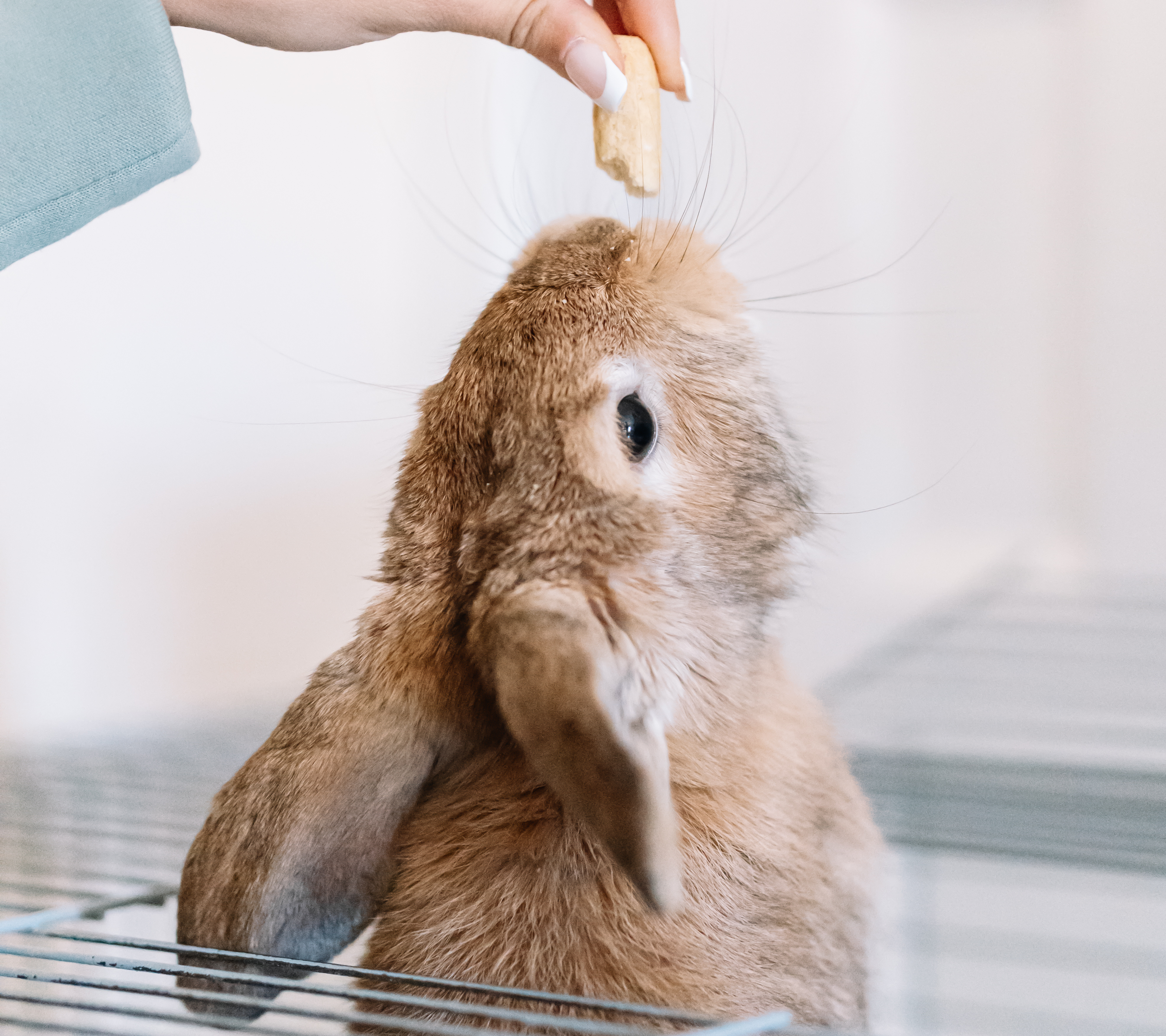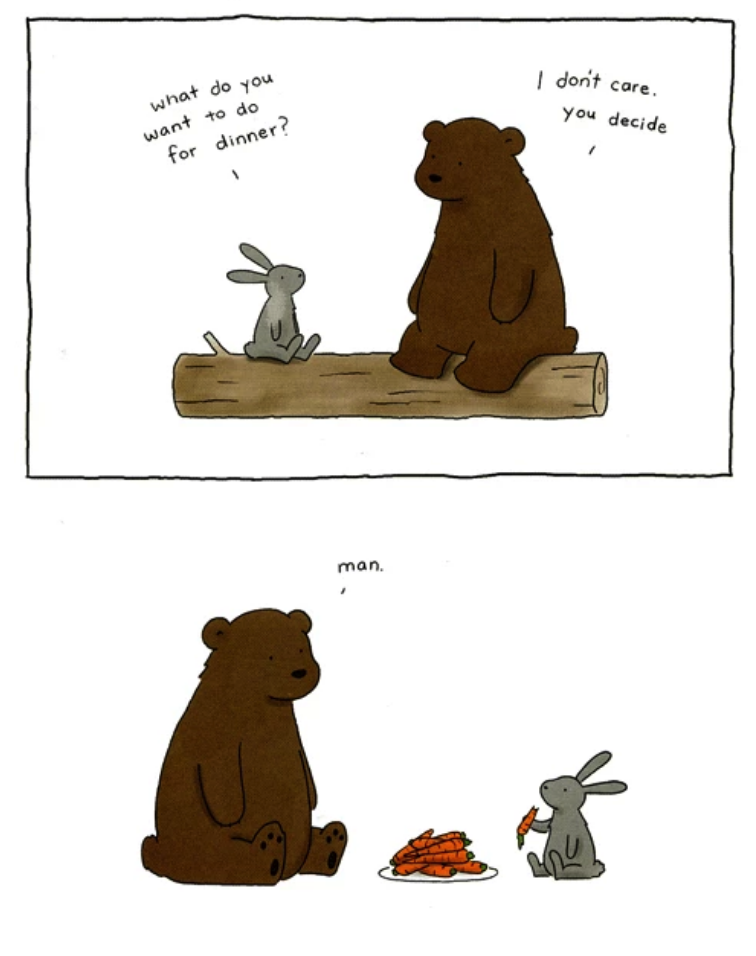What Should I Feed My Rabbit
Article - 6 min read • Updated Jun 03, 2025
Medically reviewed by Dr. Arman Chen, BVSc (Qld.), BSc (Leic.)

Your rabbit's diet matters more than you think... because your rabbit’s gut health, teeth and your wallet all depend on it!
Rabbits have delicate gastrointestinal (GI) tracts and continuously growing teeth, which makes diet one of the most important aspects of their care.
A poor diet can quickly lead to painful (and costly) complications, including GI stasis, a potentially life-threatening condition where the digestive system slows down or stops completely.
Did you know? GI stasis is one of the most common medical emergencies in rabbits. It’s often triggered by a lack of dietary fibre or dehydration.
So what should you actually feed your rabbit? Here’s a science-backed, vet-approved breakdown.
What a Balanced Bunny Diet Actually Looks Like
The golden rule that keeps things moving is HAY! An ideal daily diet for a rabbit should consist of:
- 90% high-fibre hay
- 5% fresh vegetables
- 5% quality pellets
- Limited fruit treats
- Unlimited access to fresh, clean water
Let’s dive into each component.
Hay Isn’t Just Food, It’s a Lifesaver
This is why 90% of your rabbit’s diet should be the boring stuff. Hay provides the essential fibre your rabbit needs to keep their digestive system moving and their teeth properly worn down. Rabbits' teeth never stop growing, and inadequate chewing can result in painful overgrowth or dental disease.
Best Types of Hay for Rabbits
Offer your rabbit fresh grass hays such as:
- Timothy hay
- Oat hay
- Orchard grass
Mixing hay types offers variety and balances out slight differences in nutritional content. Always discard old hay everyday and top up with fresh portions. Why? Stale hay loses its scent and taste, which can discourage rabbits from eating.
"Is it okay to feed alfafa hay?"
Alfalfa hay is too rich in calcium and protein for adult rabbits and may lead to bladder stones if fed in excess. It’s best reserved for young, growing rabbits under 6 months or underweight rabbits, and only to be fed under your vet's supervision.
Water Isn’t Optional Either
Hydration works hand-in-hand with fibre to ensure everything is kept moving and your rabbit happy! Make sure your rabbit has:
- Multiple water sources such as a bottle and a bowl
- Fresh water changed daily
- Bowls cleaned regularly to prevent bacteria build-up
Fresh Veggies Make a Great Side Dish...
But only if you choose the right ones. Hay is still king, but leafy greens can add hydration, micronutrients, and enrichment. Here are safe vegetables you can feed your rabbit:
- Carrot tops and limited carrot (due to its sugar content)
- Romaine lettuce
- Celery leaves
- Broccoli in moderation
To avoid overfeeding, just rotate vegetables weekly and introduce new ones slowly to monitor your rabbit’s tolerance.

But Some Veggies Are Trouble
Here’s what we'd recommend to skip and why. Vegetables high in oxalates such as spinach, kale, mustard greens can contribute to kidney and bladder stones if overfed.
And Other Veggies You Need to Avoid Completely
- Starchy veggies such as potatoes, yams, and corn
- Beans and lentils
- Onions, leeks, and garlic (These are toxic to rabbits)
Remember Fruits Are Treats, Not Staples For Your Bunny
Fruits are naturally high in sugar, so they should only be fed occasionally and in small amounts. How much? About 1-2 tablespoon per day for an average-sized rabbit.
Safe options include:
- Apple without seeds
- Banana
- Papaya
- Pear
- Blueberries
- Strawberries
- Mango
You can avoid overfeeding by using fruit as a high-value reward during training sessions or vet visits.
Pellets Can Help or Hurt
Rabbits love pellets, some maybe a little too much. Since they’re calorie-dense and easy to eat, they can lead to obesity and poor dental health if overfed. Stick to no more than 5% of your rabbit’s daily diet.
Since they eat so little of it, you can choose high-fibre, plain pellets without dried fruit, seeds, or coloured bits. Look for brands that contain at least 18% fibre and no added sugar.
"We recommend checking with your vet adjust the pellet portion according to your rabbit’s age, weight, and medical needs." - Dr. Arman Chen, BVSc (Qld.), BSc (Leic.)
You can feed your bunny commercially-produced treats too, but feed sparingly and not every day. Be sure to check the package's back label for sugar content and a complete ingredient list so you are aware of what goes into these treats.
What the Heck Are Caecal Pellets
And why your rabbit needs to eat them again?
Rabbits produce two types of droppings — normal dry pellets and caecotrophs (also called caecal pellets). These sticky, grape-like droppings are re-ingested by rabbits to absorb essential nutrients made in their caecum.
If Your Rabbit Stops Eating Caecal Pellets
This could be a sign of:
- Obesity
- Dental issues
- An imbalanced diet
- Underlying illness
Bring your rabbit to a vet for a thorough health check if this happens regularly.
What If My Rabbit Stops Eating
If your rabbit suddenly stops eating or pooping, this is an emergency. Their gut may have slowed down or stopped entirely and that can be life-threatening.
Rabbits are prey animals, so they tend to hide signs of pain or illness until things are very serious. If they lose their appetite, don’t wait it out.
Do not try to treat it at home with pineapple juice or other remedies you’ve read online. These may do more harm than good, especially if the issue is caused by a blockage.
Gut motility drugs given without a proper physical examination by your vet can cause a rupture in the intestines and that can be fatal.
The bottom line is, if your rabbit hasn’t eaten for several hours or you don’t see any poop in their litter box, call your vet right away. It’s always better to be safe than too late.
A Quick Consult Can Save You Stress Later
Every rabbit is different. Your bunny’s ideal diet may vary based on age, breed, activity level, and health conditions.
If you're unsure about your rabbit’s nutrition or are noticing changes in appetite, weight, or droppings, don’t wait.
Book a consultation with our experienced team at Gaia Vets in Singapore. We’re here to support your rabbit’s long-term health with personalised care.